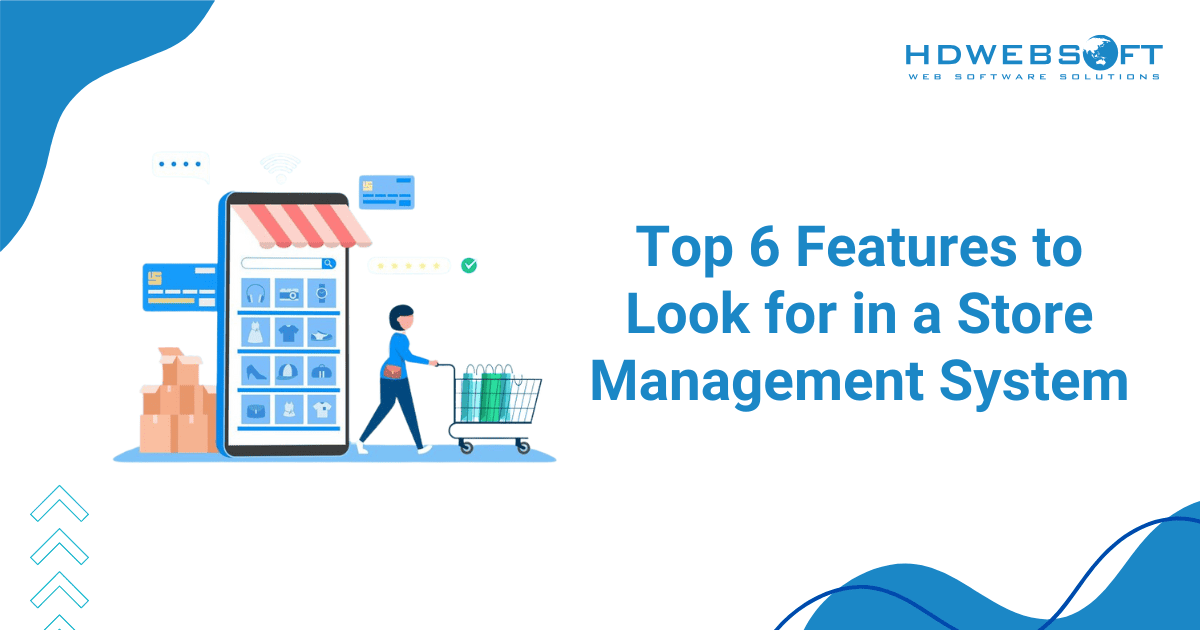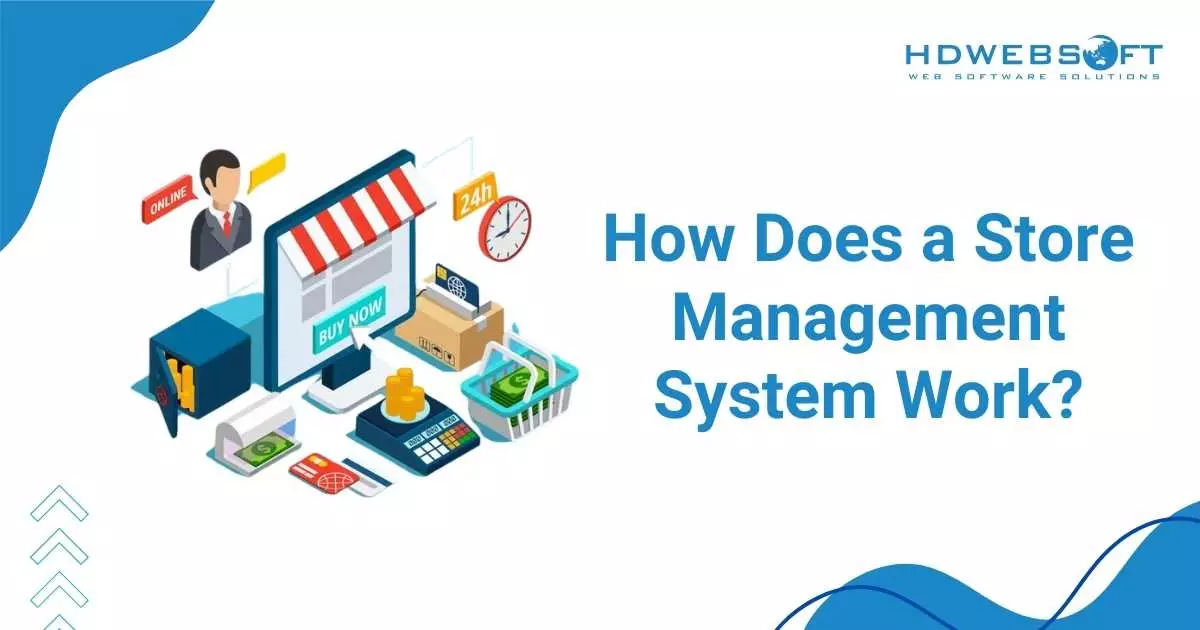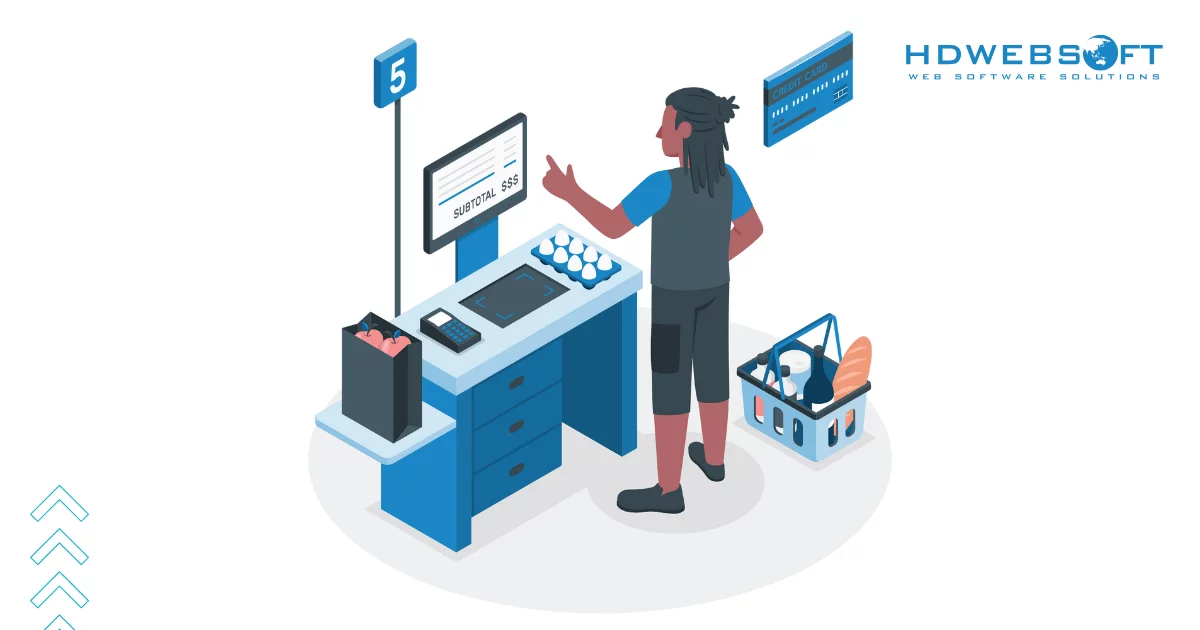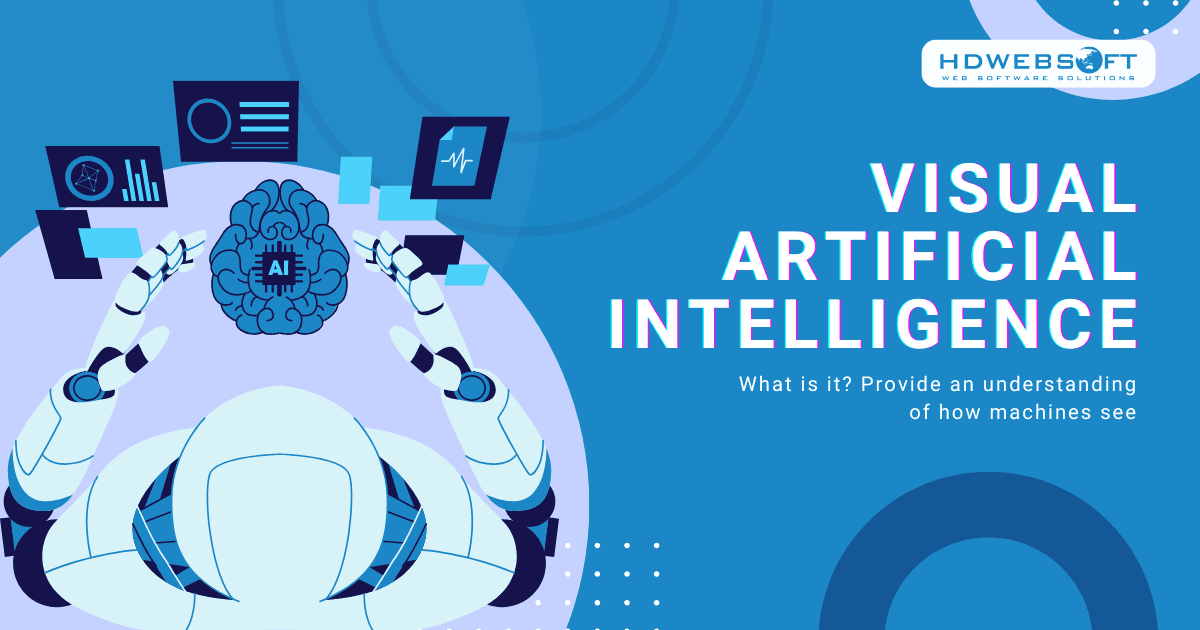
Top 6 Features to Look for in a Store Management System
A store management system is essential in the fast-paced world of retail. It is where efficient management is key to customer satisfaction and smooth business operations. For store owners, this goes beyond stocking shelves; it includes managing staff, tracking sales, and ensuring a seamless customer experience. Store management software becomes invaluable, serving as an all-in-one tool to streamline these operations. With the right technology in place, businesses can operate more effectively, minimize errors, and gain valuable insights into their performance.
In this article, we’ll show you the fundamentals of a store management system, how it works, and its benefits. Moreover, we’ll showcase the features to look for in a one-size-fits-all solution and tips for choosing the right vendor for a custom solution.
What is a Store Management System?

A store management system is an all-in-one software solution designed to help retail businesses efficiently manage operations. By integrating essential functions into one platform, a management system streamlines day-to-day tasks and helps store owners maintain smooth workflows. Additionally, it automates stock updates as sales occur, tracks purchases, and even allows managers to analyze sales trends in real-time.
It’s worth noting that the software is usually offered as a web or mobile application. It can also be tailored to suit the specific requirements of individual businesses. Therefore, businesses are free to choose a vendor that can create a custom solution to their needs.
This technology has become crucial in the retail sector, where operational efficiency directly impacts profitability. In fact, studies show that retailers using automated management systems can save up to 24% in operating costs. With the increasing adoption of AI in retail, manual errors are reduced, and inventory control has improved significantly.
With capabilities like these, a store management system empowers business owners to make data-driven decisions. In the end, they can respond faster to customer needs and ultimately improve overall store performance.
How Does a Store Management System Work?

At its core, store management software collects and processes data from multiple aspects of the store’s operations. The system integrates with the store’s point-of-sale (POS) terminals, enabling it to record every sale in real-time. In addition, it connects with the inventory database, adjusting stock levels automatically whenever a product is sold. When stock runs low, many systems will notify the manager or even trigger reorders if set up to do so.
Furthermore, a store management system often includes employee management tools, enabling managers to track hours, assign tasks, and evaluate performance. Reporting and analytics features are also common, allowing owners to view data on sales trends, customer preferences, and inventory flow. This consolidated data provides valuable insights into what products are most popular, which times see the most traffic, and how inventory moves.
The result? An efficient store that maximizes resources, optimizes stock levels, and delivers a smooth customer experience.
Benefits of Using a Store Management Software
Store management software is more than just a tool for organizing store operations. It’s a comprehensive solution that transforms how retail businesses function. Let’s dive into the advantages that make store management software an essential investment for modern retailers.
Enhanced Inventory Management
Managing inventory is one of the most critical and challenging aspects of retail. However, a store management system automates inventory tracking, ensuring that stock levels are always up to date. It notifies you when items are running low or approaching expiration, thereby helping you avoid overstocking or stockouts.
This automation saves time and reduces manual errors, allowing you to focus on other essential business activities. Moreover, by analyzing stock trends, you can identify popular products and adjust your inventory strategy to meet customer demands effectively.
Improved Sales Tracking and Reporting
With shop management software, sales tracking becomes effortless and precise. Every transaction is recorded in real-time, providing you with instant insights into revenue, sales trends, and peak business hours. As a result, this data enables you to understand customer preferences and tailor your offerings accordingly.
What’s more, the system generates detailed reports that help you evaluate performance across different periods, products, or locations. These insights empower you to make informed decisions that boost profitability and align with long-term goals.
Streamlined Employee Management
Managing a team can be complex, especially in busy retail environments. Nonetheless, a store management system simplifies this by providing tools for scheduling, task assignment, and performance tracking. It allows managers to monitor employee activities, making sure that everyone is contributing effectively to store operations.

A wise man said, “A happy team is the most productive team.”
Further notice, with features like time tracking, you can easily calculate payroll, saving time and minimizing errors. This level of organization creates a more productive and harmonious work environment.
Enhanced Customer Experience
Customer satisfaction is the backbone of retail success, and a suitable system helps you deliver a smooth shopping experience. By efficiently tracking stock, processing transactions quickly, and storing customer preferences, the system ensures that your store runs smoothly. For example, customers are less likely to encounter out-of-stock issues or delays at checkout.
Besides, many systems include loyalty program features that allow you to reward repeat customers and build stronger relationships. This is a great way to increase customer engagement and satisfaction.
Cost and Time Savings
Automating repetitive tasks reduces the workload for store managers and employees, freeing up valuable time. A store management system also helps minimize errors in inventory management, sales tracking, and employee scheduling, preventing costly mistakes. This improved efficiency allows businesses to allocate resources more effectively and focus on growth opportunities.
If we think broadly, with fewer manual processes, businesses can reduce the risk of human error. This is the kind of error that directly impacts the accuracy of operations and overall profitability. These savings can then be reinvested into business development or improving the customer experience, contributing to long-term success.

Cost and time saved for using a store management system can be invested in more important aspects of your business.
Scalability and Growth Support
As your business grows, managing multiple stores or an expanding inventory can become overwhelming. Scalable management software is designed to grow with your operations, making it easy to add new locations, products, or staff. Moreover, it centralizes data from all your stores, giving you a unified view of performance and simplifying decision-making.
As informed, this scalability ensures that your operations remain efficient and seamless even as your business evolves. By integrating scalable software, you can handle growth without compromising on the accuracy or speed of your operations. Ultimately, you are free to focus on strategic development instead of managing many works at once.
Top 6 Features to look for in a Store Management Software
The ideal software should cater to the specific needs of your store, streamlining everything from inventory tracking to customer relations. Here’s a closer look at the essential features to consider when selecting a store management system.
Smart Inventory Management
One of the most critical components of a store management system is inventory management. This feature helps you track stock levels quickly, providing instant updates whenever items are sold, restocked, or returned. Additionally, a robust inventory module alerts you when products are running low, ensuring you’re always prepared to meet customer demand.
Moreover, the ability to analyze sales trends enables you to optimize inventory by focusing on high-demand items. Consequently, this helps reduce waste from overstocked goods, ensuring that inventory levels are better aligned with actual customer needs.
Read more: Logistics Analytics 101.
Efficient Scheduling Tools
Managing your team’s workflow is much easier with built-in scheduling tools. Management software with this feature allows you to create and assign shifts, track employee hours, and monitor task completion. With that in mind, you can ensure proper staffing during peak hours or special promotions.
In short, not only does this boost productivity, but it also improves employee satisfaction. This is because the software solution will reduce scheduling conflicts and last-minute changes.
Integrated Point of Sale (POS)
A well-designed POS system is integral to any store management system. Not only does it process transactions quickly and accurately, but it also reduces wait times for customers at checkout. Furthermore, a POS module should sync with your inventory system, automatically adjusting stock levels after each sale. This synchronization ensures seamless operations and eliminates the need for manual updates.

POS system is an important feature to seek for in a store management system.
Moreover, features like multi-payment options and receipt customization can further enhance the customer experience. Integrating banking artificial intelligence will be a wise choice here as it can streamline payment processing and improve security. Ensuring both efficiency and safety in transactions is never a bad investment to be made for any business.
Customer Management Features
Understanding your customers is essential because it helps build loyalty and drive repeat business. A store management system with customer management capabilities helps you store and analyze purchase histories, preferences, and contact details. With this data, you can offer personalized promotions, loyalty rewards, or targeted marketing campaigns.
In this way, you’ll create an engaging shopping experience that keeps customers coming back with stronger relationships as a basis,
Detailed Reporting and Insights
A good shop management software provides actionable insights through detailed reporting tools. These reports can cover sales performance, inventory movement, employee productivity, and customer behavior. With access to this data, you can identify trends, measure success, and make informed decisions to grow your business.
Clearly, real-time dashboards can further enhance visibility, giving you a clear overview of your store’s performance at any moment.
Compatibility with Other Software
For maximum efficiency, your store management system should integrate seamlessly with other tools you already use. For starters, management software should seamlessly integrate with systems like Enterprise Resource Planning (ERP) and Customer Relationship Management (CRM). This ensures all your systems work together, saving time and reducing the likelihood of errors caused by manual data transfers.
Additionally, integration also future-proofs your business, as it allows you to adapt to changing needs without overhauling your software infrastructure.
5 Tips for Choosing the Right Shop Management Development Company
Selecting the right development company for your store management system is a critical decision. A reliable partner should ensure a high-quality solution while tailoring the system to your store’s unique needs. Here’s what to look for when choosing a shop management development company.
Expertise in Retail Solutions
A strong understanding of the retail industry is a must when selecting a development company. The ideal partner should have proven experience in creating retail development solutions and a deep knowledge of its operations. Therefore, this expertise should make sure that the software they build can address common pain points. Additionally, they should be up to date with the latest technologies so your system is both modern and future-ready.
Customization Capabilities
Every store operates differently, that’s why your store management system needs to reflect your specific processes and goals. One word of advice is to look for a development company that offers customizable solutions rather than one-size-fits-all software.
A good partner will take the time to understand your business and suggest features that enhance efficiency. Be it advanced reporting tools, integrated POS, or employee scheduling modules. Ideally, customization makes sure the system grows alongside your business, adapting to evolving needs.
Integration and Scalability
Your system should work smoothly with other tools your business relies on, like accounting software or intelligent e-commerce platforms. A development company experienced in system integrations can ensure smooth communication between these platforms, reducing manual work and improving accuracy.
Moreover, they should design your system with scalability in mind. You’ll be able to add new features or support multiple locations as your business expands.
Reliable Support and Maintenance
Even the most well-designed software requires ongoing support to perform at its best. Choose a development company that offers reliable post-launch services, including system updates, troubleshooting, and user training. Their responsiveness and commitment to maintenance will minimize disruptions and keep your store management system running smoothly.

Your store management system providers should provide you with on-going supports and maintenance.
A Proven Track Record
Before making a decision, it’s best to review the company’s portfolio and client testimonials. A proven track record of successful projects in the retail industry speaks volumes about their ability to deliver. Don’t hesitate to ask for references or case studies to see how they’ve helped other businesses thrive.
Check out our case study: Magento Integration to an All-in-one Seller Workspace.
Conclusion
A store management system can transform the way your store operates, providing a centralized platform that enhances efficiency, supports better decision-making, and elevates customer satisfaction. These systems are an essential tool for modern retail success. Whether you’re a small boutique or a large retail chain, investing in a robust store management system can set the foundation for sustainable growth and superior service.









